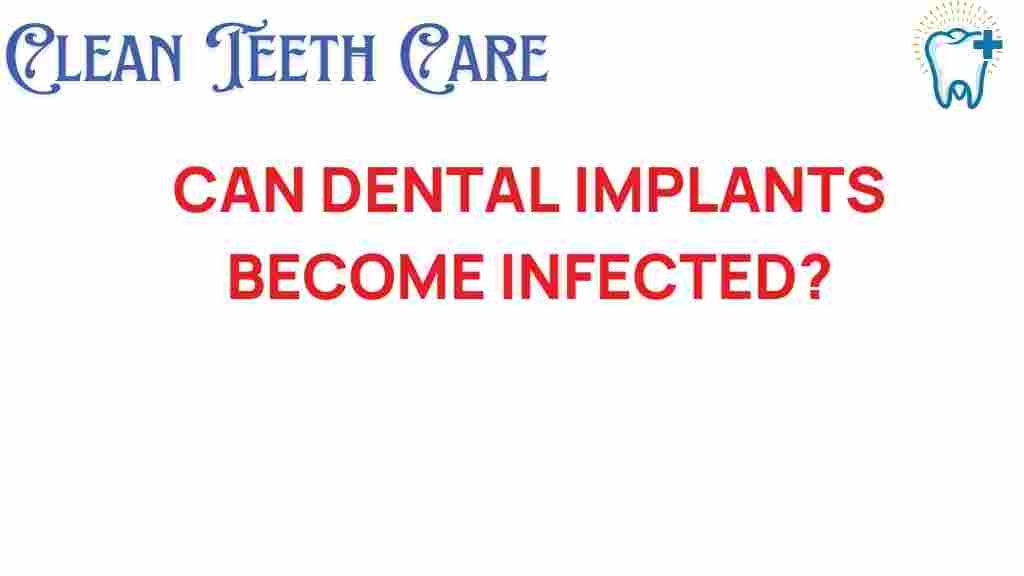Can Dental Implants Become Infected? What You Need to Know
Dental implants are a popular solution for replacing missing teeth and restoring oral function. They are designed to fuse with the jawbone, providing a stable base for artificial teeth. However, one concern that many patients have is whether dental implants can become infected. Understanding the risks, complications, and prevention strategies associated with dental implant infections is crucial for maintaining oral health.
Understanding Dental Implants
Before delving into infections, it’s essential to understand what dental implants are. Dental implants are titanium posts surgically inserted into the jawbone, acting as roots for replacement teeth or bridges. They offer numerous benefits, including:
- Durability: Implants can last a lifetime with proper care.
- Improved Oral Health: They do not require adjacent teeth to be altered, preserving natural tooth structure.
- Enhanced Appearance: Implants look and feel like natural teeth.
- Convenience: Unlike dentures, implants do not require adhesives and are more stable.
The Risk of Infection with Dental Implants
While dental implants are generally safe, there is a risk of infection. Implant-related infections can occur due to several factors, and understanding these factors is key to preventing complications. Here are the primary risks associated with dental implant infections:
- Pre-existing Conditions: Patients with diabetes, autoimmune diseases, or those who smoke may have a higher risk of infection.
- Hygiene Practices: Poor oral hygiene can lead to plaque buildup around the implant, increasing the risk of infection.
- Quality of Surgery: An inexperienced surgeon may increase the risk of complications, including infection.
- Foreign Body Response: The body may react to the titanium implant, leading to inflammation and infection.
Types of Infections Related to Dental Implants
Infections related to dental implants can generally be classified into two categories:
- Early Infection: This occurs shortly after the implant is placed. Symptoms may include swelling, pain, and redness around the surgical site.
- Late Infection: This can develop months or years after the implant placement, often due to poor oral hygiene or underlying health issues.
Signs and Symptoms of Infection
Recognizing the signs of infection early is crucial for effective treatment. Common symptoms include:
- Pain or discomfort around the implant site
- Swelling or redness of the gums
- Persistent bleeding
- Pus or discharge from the implant area
- Fever or general malaise
Prevention of Dental Implant Infections
Preventing infections is vital for the success of dental implants. Here are effective strategies to minimize the risk:
1. Maintain Proper Oral Hygiene
Good oral hygiene is essential. Brush your teeth at least twice a day and floss daily, paying special attention to the area around the implant. Use an antibacterial mouthwash to reduce plaque buildup.
2. Regular Dental Visits
Schedule regular check-ups with your dentist for professional cleanings and assessments. Your dentist can monitor the health of your implants and identify potential issues early.
3. Follow Post-Operative Instructions
After implant surgery, follow your dentist’s post-operative care instructions carefully. This may include recommendations for diet, activity level, and medication.
4. Manage Underlying Health Conditions
If you have pre-existing health conditions such as diabetes, work with your healthcare provider to manage your condition effectively. Optimal health can significantly reduce your risk of infection.
Troubleshooting Tips for Possible Infections
If you suspect that your dental implant may be infected, consider the following steps:
- Contact Your Dentist: Do not delay in contacting your dentist if you notice any signs of infection.
- Document Symptoms: Keep a record of your symptoms, including when they began and any changes.
- Avoid Self-Diagnosis: Do not attempt to diagnose or treat an infection on your own. Professional evaluation is essential.
Treatment of Dental Implant Infections
Timely treatment of dental implant infections is crucial to avoid further complications. Treatment may include:
1. Antibiotics
Your dentist may prescribe antibiotics to eliminate the infection. It’s essential to complete the full course of antibiotics, even if symptoms improve.
2. Cleaning and Debridement
In some cases, the dentist may need to clean the area around the implant to remove any infected tissue or debris.
3. Surgical Intervention
If the infection is severe, surgical intervention may be necessary. This could involve removing the implant or addressing any underlying bone issues.
4. Replacement of the Implant
In some cases, if an implant becomes infected and fails, a replacement implant may be considered after the infection has been treated.
Risks Associated with Dental Implants
While dental implants are generally safe, it’s essential to be aware of the risks involved. Aside from infections, potential risks include:
- Implant Failure: This can occur if the implant does not properly integrate with the jawbone.
- Nerve Damage: Improper placement of the implant can lead to nerve damage, causing pain or numbness.
- Sinus Issues: Implants placed in the upper jaw can sometimes protrude into the sinus cavities.
Conclusion
Dental implants offer an excellent solution for restoring smiles and improving oral health. However, understanding the potential for infection is essential for ensuring their long-term success. By practicing good oral hygiene, attending regular dental check-ups, and being aware of the signs of infection, you can significantly reduce the risks associated with dental implants.
If you have concerns about dental implants or are experiencing symptoms of infection, it’s crucial to consult with your dentist. For more information on oral health and dental care, visit this resource.
Taking proactive steps to maintain your dental implants can help you enjoy the benefits they offer without the complications of infection.
For further reading on dental care practices, you can check this article.
This article is in the category Treatments and created by CleanTeethCare Team
